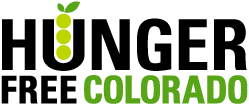Closing Denver SNAP Gap Could Reach 20,000 More Low-Income People
DENVER (December 12, 2018) – A new report endorsed by a broad coalition of Denver leaders provides a roadmap to help the City and County of Denver enroll more low-income residents in the federal Supplemental Nutrition Assistance Program (SNAP) and access funding to prevent hunger, improve health and well-being and boost the local economy. Hunger Free Colorado estimates that in 2016 more than a third (36%) of low-income individuals in Denver missed out on SNAP benefits. The Denver SNAP Task Force, which developed the new report, set a goal of closing the Denver SNAP gap by enrolling 80 percent of low-income Denver residents. This would bring nearly $16 million per year to more than 20,000 low-income Denver residents and generate an additional $28 million in local economic activity.
The Denver SNAP Task Force was composed of public, private and nonprofit sectors, including health, education, government, philanthropic and community-based partners, food retailers and people with direct experience of hunger and SNAP. The Task Force was convened by Hunger Free Colorado, Food Research & Action Center and The Food Trust, and co-chaired by Todd Jorgensen, deputy executive director for assistance at Denver Human Services, and Sandra Stenmark M.D., clinical professor of pediatrics at University of Colorado, with support from Target.
“We were thrilled to see so many voices convene, recognize the importance of SNAP, and work in partnership to maximize the program’s benefit to their community,” said Kate Kasper, director of public policy at Hunger Free Colorado. “We are particularly grateful that we were able to tap into the expertise of those with real-life experience of hunger.”
The Denver SNAP Task Force was formed to identify barriers to obtaining higher participation in SNAP and create a set of policy recommendations for the City and County of Denver to educate people about the program and assist eligible individuals in obtaining SNAP benefits.
Strategies from the report include:
- more targeted and culturally competent outreach,
- improved communication and user experience for clients and
- increased collaboration between public, private and community-based organizations.
There is also a call for improved programs and processes, such as:
- streamlined SNAP enrollment for seniors,
- increased incentive programs and
- better use of technology for benefit enrollment.
“When implemented, these recommendations stand to impact the more than 20,000 people who we believe are eligible and therefore have a right to access assistance like SNAP but are today struggling to put food on the table,” Todd Jorgensen, deputy executive director of assistance programming at
Denver Human Services and co-chair of the SNAP Task Force said. “This report outlines ways for us to partner with our community to connect more people to healthy, affordable food supports and other services that improve the overall health and well-being of our residents.”
Addressing SNAP enrollment is important for the health and economic security of Denver’s future. A growing body of national research points to the role of SNAP in lowering health care costs, promoting work and economic stability, helping older adults live independently, and boosting local economic activity, such as grocery sales. Additionally, studies show connecting families and individuals to nutritious food leads to better academic performance and lower rates of chronic conditions, including obesity, diabetes, and heart disease.
“No child, older adult, family or individual should go hungry in the City and County of Denver, especially when we have resources here specifically to support us when we need it that are going unused,” said Mayor Michael B. Hancock. “I applaud the work of the Denver SNAP Task Force in developing these recommendations and look forward to working together as a community to eliminate hunger in Denver.”
“Enrollment in SNAP has been associated with improved health, prevention of chronic illness and decreased health care costs,” said Sandra Stenmark M.D., clinical professor of pediatrics at University of Colorado and co-chair of the SNAP Task Force. “This report serves as a call-to-action for all sectors to increase SNAP enrollment and ensure Denverites have access to the fuel needed to thrive.”
View the report, Closing the SNAP GAP in Denver, at HungerFreeColorado.org/SNAPGAP.
Hunger Free Colorado, a statewide nonprofit organization founded in 2009, leads efforts to connect families and individuals to food resources and fuels change in systems, policies and social views, so no Coloradan goes hungry. By leveraging the power of collaboration, innovation and partnership, Hunger Free Colorado eliminates barriers to the access of affordable, nutritious food and brings a unified, statewide voice to the issues and solutions surrounding hunger. Some key initiatives include a statewide food resource hotline and mobile services, Hunger Through My Lens, and the Colorado Food Pantry Network. Learn more at HungerFreeColorado.org.
Food Research & Action Center (FRAC) is the leading national nonprofit organization working to eradicate poverty-related hunger and undernutrition in the United States. Founded in 1970, FRAC provides coordination, training, technical assistance, and support on nutrition and anti-poverty issues to a nationwide network of advocates, service providers, food banks, program administrators and participants, and policymakers. To learn more about FRAC, visit www.frac.org
The Food Trust, founded in 1992, strives to make healthy food available to all. Working with neighborhoods, schools, grocers, farmers and policymakers, The Food Trust has developed a comprehensive approach that combines nutrition education and greater availability of affordable, healthy food. To learn more about The Food Trust, visit www.thefoodtrust.org.
Media Contact: Ellie Agar, Director of Communications, (720) 464-3620
